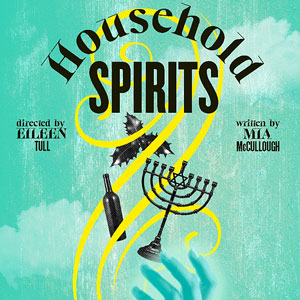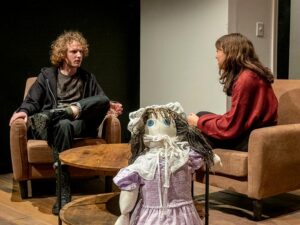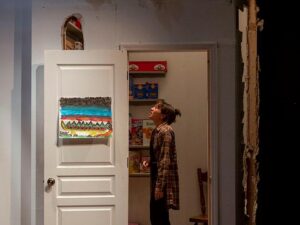
 ** “Household Spirits” by Mia McCullough is about a dysfunctional family and the grief, pain, and hurt that the characters experience in the course of their daily lives. Billed as a dark comedy, it is more sad than anything else, especially with its intriguing climax and dramatic conclusion. Spirits, it turns out, may govern more aspects of our normal lives than we might want to believe! While the production can boast of excellent acting and a script that merges fantasy, reality, and horror in unusual and clever ways, it contains too many superfluous elements and inconsistencies. These make things confusing and the show unnecessarily long. There is no reason for the performance to last a whopping 2 hours and 40 minutes including intermission, especially when billed as having a two-hour runtime.
** “Household Spirits” by Mia McCullough is about a dysfunctional family and the grief, pain, and hurt that the characters experience in the course of their daily lives. Billed as a dark comedy, it is more sad than anything else, especially with its intriguing climax and dramatic conclusion. Spirits, it turns out, may govern more aspects of our normal lives than we might want to believe! While the production can boast of excellent acting and a script that merges fantasy, reality, and horror in unusual and clever ways, it contains too many superfluous elements and inconsistencies. These make things confusing and the show unnecessarily long. There is no reason for the performance to last a whopping 2 hours and 40 minutes including intermission, especially when billed as having a two-hour runtime.
Deceased wife and mother Clara (Ilyssa Fradin) returns as a ghost to her husband’s newly blended family and is now haunting their former house. Clara’s ex-husband Philip (Doug MacKechnie) is now in a second marriage to his wife Evelyn (Jennifer Jelsema). Both apparently were once attracted to each other, in part, because of their shared love of drinking premium quality alcohol. But now Philip is, in theory, on the wagon after having been in prison for 18 months for something related to his DWI (but we never learn exactly what). Clara and Philip’s son Erik (Nathan Hile) seemingly cannot deal with his mother’s death and has basically tuned out: He constantly listens to music via his earbuds, is into smoking weed, and wants to go into the military when he graduates from high school. Evelyn’s daughter from her first marriage, Rox (Téa Baum) is constantly chatting on her phone and never wants to talk to other family members, especially her mother. Perhaps she is still hurting from the earlier divorce; we can only guess. Erik doesn’t like his new stepmother and Rox doesn’t like her new stepfather, so they have something in common. The family’s housekeeper Angela is played by Cindy Gold in an incredibly brilliant performance. Gold is so authentic in her role that you could just walk up to her, introduce yourself, and hug her! It seems that Angela has a sixth sense and can tell when Clara the ghost is hanging around. Somehow, she notices a change in the air or observes the unexplainable closing of the pantry door. Director Eileen Tull nicely ensures that the other characters don’t intentionally interact with Clara or accidentally touch her so as to perpetuate the illusion that she really is a spirit.
The apt title “Household Spirits” also refers to the fact that bottles of alcohol are located throughout the house, often hidden away in the most unusual places. Phil’s alcoholism and his relapses are tragic, and the speeches he makes about trying to cure himself via the 12-step program are fascinating. Then too, Erik (like his mother Clara when she was alive) hears voices and has been diagnosed with schizophrenia. Is the marijuana he’s using a contributing factor to his illness? His father thinks so. While everybody is suffering in some way, Phil and Evelyn try to escape through their relationship with each other, by holding a Christmas/Chanukah party in their living room (and later by going someplace special on New Year’s Eve). All the while, Phil is not supposed to drink or to be anywhere near alcohol. How can he be incentivized not to drink? And what should they do with all the booze?
While the advance piece states “Get set for a thrilling holiday party”, we never actually see any partying going on—or hear any noise or loud music emanating from the living room/dining room adjacent to the kitchen. In fact, all the action in this play takes place in the kitchen and a cozy area off to one side (with a fitting set design by Manuel Ortiz). During the talked-about party, we see lots of booze in the kitchen. Shouldn’t tons of food and stacks of clean and dirty dishes be filling up the counter space? But when portions of the plot don’t match up with each other, we know we’re in trouble. For example, when the curtain comes up, we see Clara presumably killing herself by sticking her head in an oven; later we are told that she died in a fire; further along, we are told that she hanged herself. At one time, we are told that she died five years ago; at another time, we’re informed that her untimely death happened when her son Erik was a young child (perhaps six years old), shortly after he made a drawing that hangs on the back of the pantry door; and today Erik looks to be about sixteen or seventeen. Then too, the play strays into implausibility having to do with cause and effect. We are warned in advance that there will be a gun on stage. One moment the gun has bullets in it, then it doesn’t, and then it mysteriously does again.
Other inconsistencies and weird coincidences might even be worse. Later in the show, we are introduced to Leo (Joe Zarrow), Evelyn’s first husband, who happens to be Jewish and who unexpectedly shows up at the house. He stumbles upon his ex-wife when Philip brings him home as his Alcoholics Anonymous sponsor. Almost immediately, Leo notices the life-sized female doll used by his grandmother to hide contraband from the Nazis during the Holocaust. We are told at one moment that “the stepdaughter” now owns the doll, referring to Rox, so that means that the doll should have been in Clara’s family (not Leo’s family)—and Clara, we learn, is Jewish too. (But Evelyn and Phil are not.) We also listen to the doll’s reflections over the P.A. system, with Suzanne Petri being the voice of the doll named Julia. It is then that we learn that Julia has been around for countless generations and has been inherited by many. In this generation, the doll is the primary interface for Clara to gain the attention of others. While Clara sometimes moves things around or strews them about the room, she often uses Julia as a prop to indicate her ghostly presence.
The best part about this show is that it is highly imaginative. Throughout, we must suspend our belief in what constitutes everyday reality and accept the idea of ghosts, haunted houses, and haunted dolls. That said, this world premiere production is a disappointment, and the script needs a major rewrite to shorten and sharpen it and make it more cohesive. Arguing over who gets to wear Clara’s old clothing (nice costume design by Rachel Sypniewski) may be very real but takes away from the plot—though this is a minor point. More importantly, the focus on interreligious marriage is wholly unnecessary; the entire “Jewish angle” (with its emphasis on the menorah, etc.) is pointless, except that the family holds a holiday party rather than a Christmas party. But perhaps most significantly, the idea of holding a party in the first place doesn’t add anything either. Yes, we understand that Philip is very tempted to drink when he shouldn’t, and joining in a party with friends who drink would be a great opportunity to relapse. But clearly there could be other temptations that the audience could witness first-hand which would make the point better and the overall story stronger. What is exceedingly well done, however, is the implication that while drinking too much alcohol or smoking too much weed may lead to hallucinations or delusions, there is, separately, an unseen realm where spirits actually do exist—and they may be able to influence us in ways that we cannot even conceive of.
production is a disappointment, and the script needs a major rewrite to shorten and sharpen it and make it more cohesive. Arguing over who gets to wear Clara’s old clothing (nice costume design by Rachel Sypniewski) may be very real but takes away from the plot—though this is a minor point. More importantly, the focus on interreligious marriage is wholly unnecessary; the entire “Jewish angle” (with its emphasis on the menorah, etc.) is pointless, except that the family holds a holiday party rather than a Christmas party. But perhaps most significantly, the idea of holding a party in the first place doesn’t add anything either. Yes, we understand that Philip is very tempted to drink when he shouldn’t, and joining in a party with friends who drink would be a great opportunity to relapse. But clearly there could be other temptations that the audience could witness first-hand which would make the point better and the overall story stronger. What is exceedingly well done, however, is the implication that while drinking too much alcohol or smoking too much weed may lead to hallucinations or delusions, there is, separately, an unseen realm where spirits actually do exist—and they may be able to influence us in ways that we cannot even conceive of.
“Household Spirits” is playing through November 11, 2023, at Theater Wit, 1229 W. Belmont Avenue, Chicago.
 Tickets are $18-$55.
Tickets are $18-$55.
Performance schedule:
Thursdays, Fridays, and Saturdays at 7:00 p.m.
Sundays at 2:00 p.m.
with an added industry/Halloween Eve performance on Monday, October 30 at 7:00 p.m.
For more information or to purchase tickets, go to https://theaterwit.org/, call 773-975-8150, or visit the Theater Wit box office, 1229 W. Belmont Avenue, Chicago.
To see what others are saying, visit www.theatreinchicago.com, go to Review Round-Up and click at “Household Spirits”.
photos-Charles Osgood






More Stories
“The Firebugs” reviewed by Julia W. Rath
“The Book of Grace” Al Bresloff with another from Paul LIsnek
“The Last Five Years” MILWAUKEE